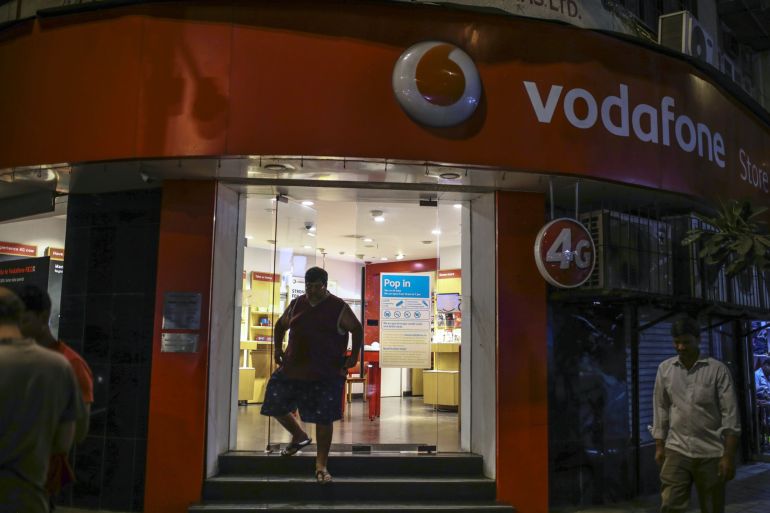Vodafone Idea finds a new investor to rescue it: Indian gov’t
Vodafone Idea will convert into equity its past dues to the gov’t, giving the latter a nearly 36 percent stake in it.

Indian telecom operator Vodafone Idea Ltd said its board has approved converting into equity its past dues to the government, giving it a nearly 36 percent stake in the country’s third largest telecom operator.
Under the rescue plan, it will convert into equity the full amount of interest related to spectrum auction instalments and dues owed to the government for use of airwaves, the company said on Tuesday.
Keep reading
list of 4 itemsUS Big Tech firms jostle for India’s huge digital payments market
Car bomb, corruption, COVID: ‘Sordid’ drama rocks India’s Mumbai
The US and India have a lot of work to do on digital cooperation
The “net present value” of the interest is expected to be about 160bn Indian rupees ($2.16bn), according to the company’s estimates.
Following the conversion into equity, the Indian government is expected to hold about 35.8 percent of the total outstanding shares of Vodafone Idea. Promoter shareholders Vodafone Group will hold 28.5 percent and Aditya Birla Group 17.8 percent.
Vodafone Idea’s shares slipped as much as 19 percent during trading in Mumbai, most in over five months. Benchmark S&P BSE Sensex was trading marginally higher on Tuesday.
The beleaguered wireless carrier has not reported an annual profit since Reliance Jio Infocomm Ltd sparked a brutal price war in 2016. While the latest move avoids bankruptcy for the joint venture between the Vodafone Group and billionaire Kumar Mangalam Birla’s conglomerate, it will be a stopgap measure for the company that has been losing customers in droves. Investors will also be concerned about what the sudden change into state control means.
“While this would stave off the immediate danger of bankruptcy, it does not augur well for any equity investor in a private company” in the company, said Utkarsh Sinha, managing director at consultancy Bexley Advisors in Mumbai. “Obvious concerns about its performance as a semi-state run unit aside, this sends a very negative signal to the business community.”
“Dilution in stake is something the promoters or existing shareholders do not welcome much. Somewhere around 10 percent to 15 percent of dilution to the government would have been welcomed,” said Likhita Chepa, senior research analyst at CapitalVia Global Research.
Sector disrupted
India’s telecom sector was disrupted by the entry of billionaire Mukesh Ambani’s Reliance Jio and forced some rivals out of the market. The sector’s troubles have also been compounded by the huge dues owed to the government.
Vodafone Idea, a combination of the India unit of Britain’s Vodafone Group and Idea Cellular, has paid the government 78.54 billion rupees ($1.05bn) in dues, but still owes roughly 500 billion rupees ($6.7bn).
India’s top court in 2020 gave telecom firms 10 years until 2031 to clear dues, but rejected a plea last year seeking corrections to the calculation.
Larger rival Bharti Airtel said on Friday it will not convert interest and government dues into equity.
“From the sector perspective it is clear that the market will not shrink to two players … the government coming in doesn’t change anything in terms of a competitive landscape as they are not infusing any capital,” Ambit Capital analyst Vivekanand Subbaraman said.